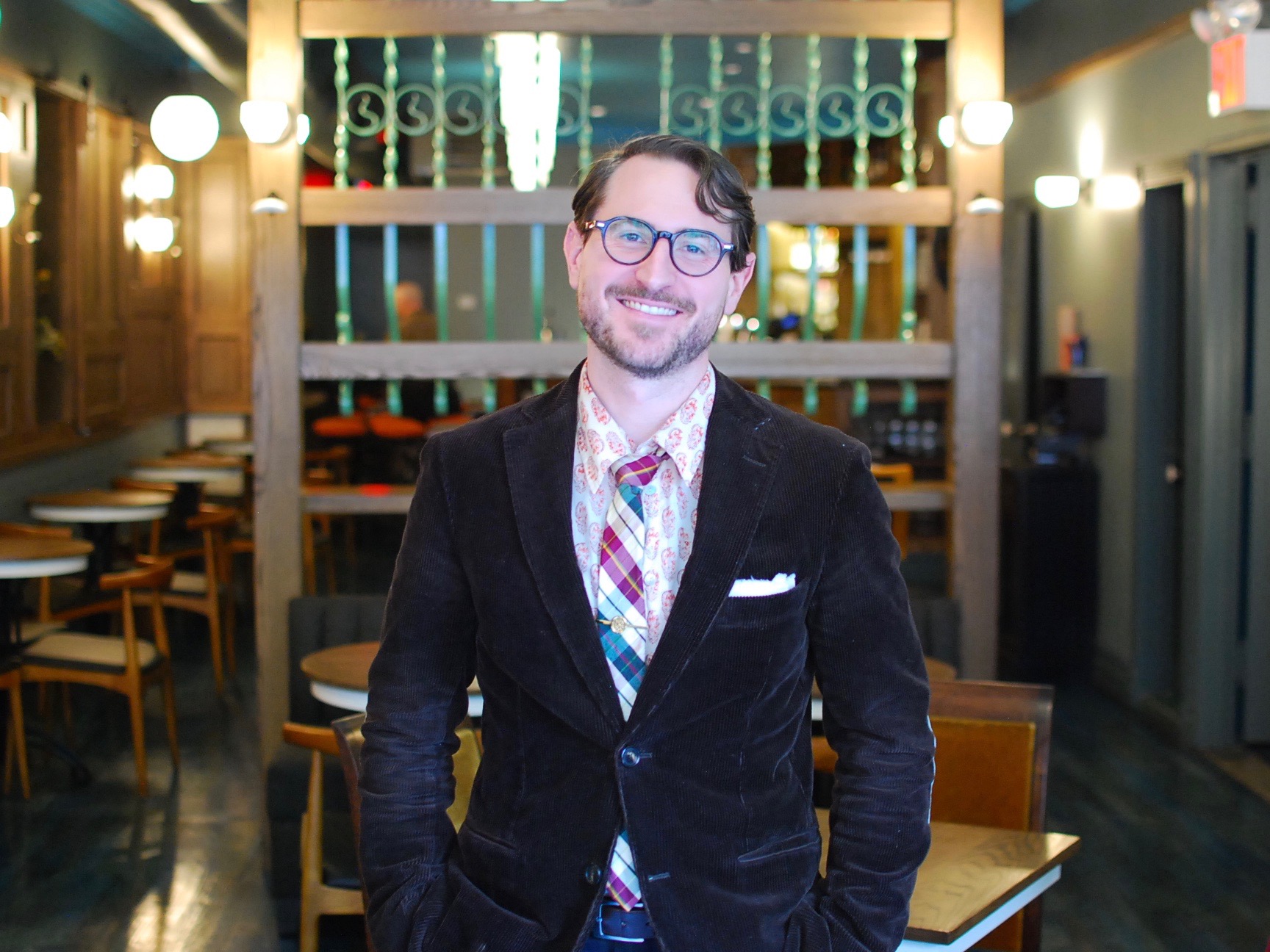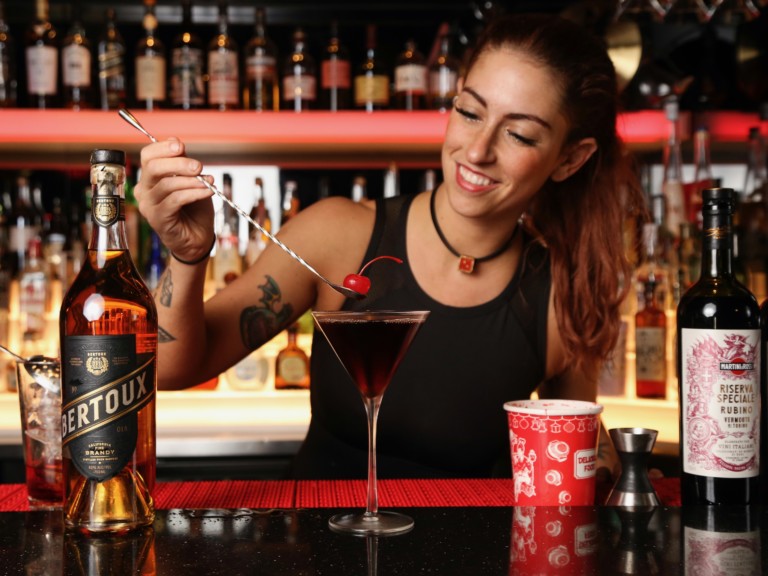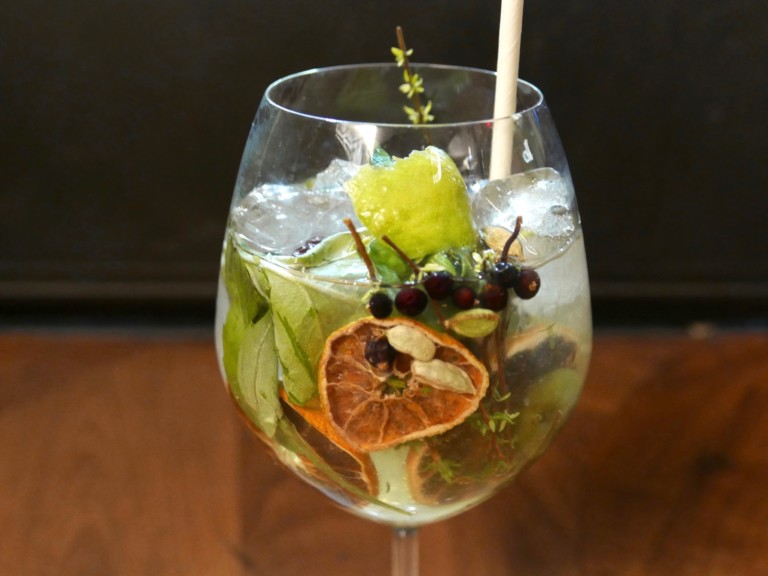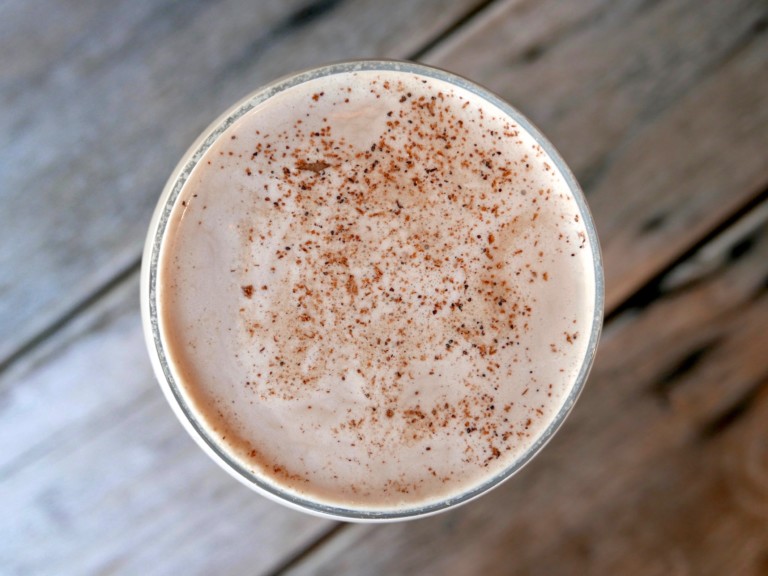Miami native Joaquín Simó spent five-and-a-half years behind the bar at Death & Co. before joining Alchemy Consulting partners Toby Maloney, Jason Cott and Troy Sidle on Pouring Ribbons, a second story East Village bar with a name grounded in physics. On January 14, I met Simó at Pouring Ribbons, and he shared several spirited insights.
Josh Lurie: Where does the name Pouring Ribbons come from?
Joaquín Simó: The name refers to the movement of alcohol through air. It’s just what happens visually when you’re pouring a drink. It’s that moment of anticipation when you set a frozen glass down in front of a guest. Say you’re going to pour a martini from your mixing glass. If you’re watching the pour, the way it’s going to go from the mixing glass into the glass, it’s going to twist on itself in a double helix form, so it looks like you’re pouring a ribbon, and that’s just the aerodynamic properties of alcohol that do that. Water does it significantly less.
JL: Was it always your intention to open your own place?
JS: That’s been the dream for a really long time. That was certainly the goal when I got in at Death & Co., was to learn as much as possible in order to put myself into a position to succeed on my own. Five-and-a-half years, it took a lot of learning to feel comfortable, and in that time, I met my partners in Alchemy Consulting and have become a partner in that. Having three partners with such wildly different skill sets than mine really helped a lot in opening a place with somebody who could much more effectively write a business plan and someone who is much better at dealing with some of the systems and the POS set-up and things like that. My partners were able to fill in my own blanks pretty magnificently and allow me to concentrate on what I best do for Pouring Ribbons.
JL: How did you meet your partners in Alchemy Consulting?
JS: I’d known Toby [Maloney] and Jason [Cott] from serving them at Death & Co. and we always had a lot of friends in common, this being a fairly tight knit community. We basically just started feeling each other out in terms of seeing what it would be like to work together. At this point, Alchemy had grown perhaps beyond the capabilities of two people being asked to do the amount of work they were being asked to do, and I got brought on board on a trial basis to see how I meshed working creatively with Toby and working with Jason in terms of, do I meet deadlines? Do I show up on time? What’s my performance? All of those qualitative things. I passed with flying colors on both of those things, fortunately, and I found I really enjoyed working with them. I became a full partner with them while working at Death & Co. Fortunately, getting shifts covered at one of the best bars in the world is not that hard. You just have to say, “Hey, who wants to work a Friday night at Death & Co.?” People spring up…I had some flexibility to travel and take on additional responsibilities with Alchemy during my time there. A lot of credit goes to Dave Kaplan and Frankie Rodriguez, the owner and GM, respectively, at Death & Co., for always being supportive of side projects that we would do.
JL: What brought you to New York originally?
JS: I was living in Boston and had started to bartend a couple years prior to the move. I’d gone to school at BU and started working the door. After I graduated I started barbacking and started bartending. Some of it, I just felt like I was treading water in Boston and felt like my own social and professional circles, those Venn diagrams had almost meshed completely. I knew I wanted to do more, and didn’t know if I was to, in that city, with the networks I already had…I knew I wanted to learn more and get better at it, but I just felt like I was so entrenched in Boston and moving away from the people I’d known and worked with would have been a little more challenging…I’d always wanted to move to New York and knew that New York was such a big stage, it makes you or breaks you. If you can succeed here, you can pretty much succeed anywhere.
JL: So they say…What was your major at BU?
JS: It was English and Religion.
JL: Do you feel like those help you at all in bartending?
JS: Surprisingly, yeah. More than anything else, it allows me to communicate pretty effectively. What I still love about the booze business is the stories, stories behind the great products, behind the brands, behind the categories of booze. So my ability to read a book on gin and distill that – if you’ll pardon the pun – distill the essence of what was said in there into a handful of sentences to a customer on a busy Friday night in a way that allows them to get gin in a way they hadn’t gotten it before, is great. That was all exegetical work and all the parsing of diction and all of the stuff that got drilled into me when you’re reading 1,000 – 1,200 pages a week and condensing that. That really paid off professionally and allowed me to get better at taking large amounts of complex information and rendering it accessible and comprehensive.
JL: Did you consider other careers, or did you always know you wanted to work with cocktails and spirits for a living?
JS: I put myself through school doing tech support for an ISP. I was almost a complete neo-Luddite prior to that, so most of my friends and family were shocked that anyone would call me for tech support, but more than anything else it was customer service. A grandmother calls you on the phone, doesn’t know how to set up her e-mail, so you’re walking her through how to set up Eudora or Outlook Express on her Windows 95 machine so she can download the photos of her grandkids that her son sent. Step by step, walking her through all of that. Most of the time, when people call tech support, they’re either frustrated, angry, at their wit’s end or all of those. The ability to calm somebody down and get them to – especially if they don’t understand what the problem is – walk them through figuring out what the problem is, and then doing that. It’s kind of like when people show up to a bar and they’re having a rough day. A lot of that, customer service is the bigger umbrella, under which I’ve always worked, from being the assistant parish secretary at my church when I was 15 til I was 18 or 19, to tech support when I was in college, to then working in bars and restaurants afterwards, I’ve always worked in customer service. You don’t away from that. So the core of what I do, I’ve always done. It’s taking care of guests, taking care of customers. That sort of thing has always been there, it’s just the specific applications from which I do the rest of my job have changed considerably.
JL: What your very first night like behind the bar, and at which establishment?
JS: That was at the White Horse Tavern in Allston, which is this glorious little student ghetto, mainly populated by BU and B.C. kids. It was a 250-person capacity college neighborhood bar and it was mainly where you’d barback and on slower nights, you ended up bartending, more than anything else, was how that went. It was already a bar set-up I was familiar with. You weren’t making very complicated drinks. These were a lot of Jack and Cokes, Woo Woos, Redheaded Sluts and Jäger bombs. This was not anything too crazy, but you have a full room in there, and it’s three-deep at the bar, you really have to learn how to prioritize. I remember being really nervous the first time I had to make a margarita. I knew what went in it, but how much sour mix off the gun goes in there? Do you put a splash or orange juicy in there? Which Cuervo Gold am I grabbing? All those little things like that, I remember that taking awhile. One of my early bosses remembers me always squeezing limes from the garnish bin into margaritas, because I thought Rose’s was gross even then.
JL: What does a cocktail have to be to go on the menu at Pouring Ribbons?









Leave a Comment